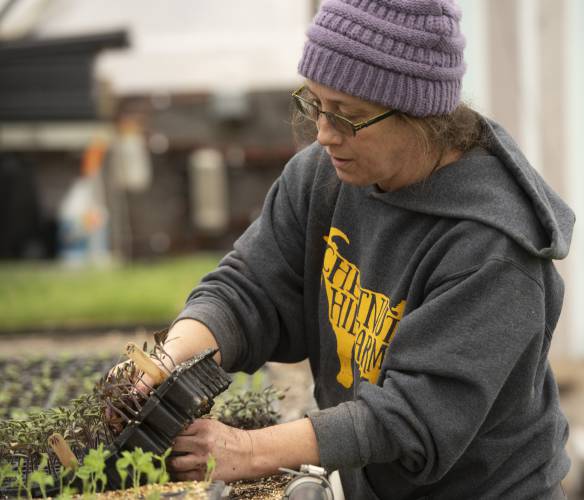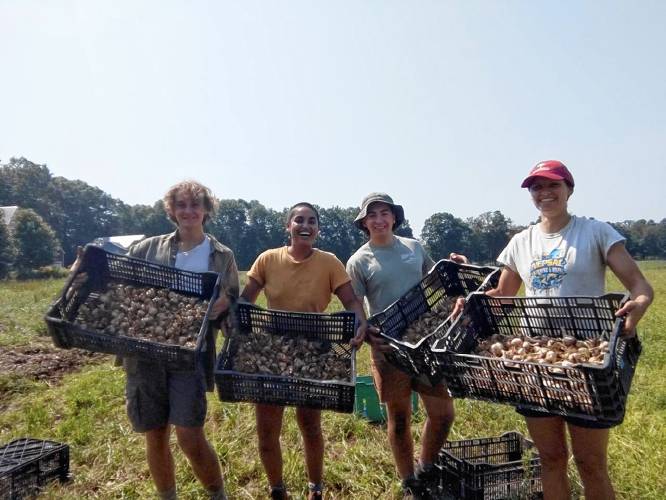Agriculture is at the heart of our region’s health and food security. Yet New England is losing about 1,500 acres of farmland every year. With more farmers aging out of the business, and many of their children choosing other occupations, it’s vital to keep our local land in farming.
Conserving those lands as farms is one important tool for that, as nonprofit land trusts, alongside public agencies, work with farmland owners who choose to protect their land.
Our area is fortunate to have many innovative alternatives to the traditional farm business model that directly benefit communities in other ways. These include getting healthy food into the hands of people who need it most, and providing opportunities for others who have historically faced barriers to owning their own farms. Land trusts often play a role in helping to promote these alternative models.

Desiree Robertson-Dubois, the Greenhouse manager at Simple Gifts Farm in Amherst, plants the first green house tomatoes of the season on Tuesday, Feb. 22, 2022. “Magic happens here and it’s warm, that’s why I love the green house,” said Robertson-Dubois. GAZETTE FILE PHOTO
The Community Farm model has several examples in our region. Created by and for the community, the land is usually owned by a nonprofit entity — often run by farmers — and leased to other farmers who are committed to the land for the long term.
The North Amherst Community Farm (NACF) was established in the early 2000s by a group of neighbors who wanted to save one of the area’s last working farms. They launched a neighborhood fundraising campaign, and partnered with Amherst, the state and Kestrel Land Trust to purchase and conserve the 36-acre property.
NACF then signed a long-term lease with Simple Gifts Farm, an organic CSA, or community-supported agriculture operation. They have formed a successful public-private partnership that promotes sustainable organic farming methods, provides farm products to the region, and educates the community on food and farming issues. NACF also protects a wildlife corridor and provides public walking trails around the farm.

Garlic harvesters (l to r) Sam Watson-Stevens, Rohini Narayanan, Tim Barker Plotkin, and Annabelle Farnham at Simple Gifts Farm in North Amherst. Simple Gifts has a long-term lease on land owned by the North Amherst Community Farm, a nonprofit that purchased the land with help from the Town of Amherst and the Kestrel Trust. Photo: Simple Gifts Farm.
A few years later, Northampton became the site of another dynamic community farm, created by neighbors who wanted to save the 180-acre Bean-Allard Farm. They worked with the national nonprofit Trust for Public Land and the city of Northampton to permanently preserve it, with additional financial support from Kestrel.
Soon they established Grow Food Northampton with a mission “to create a just and resilient local food system that nourishes our community and protects and enriches the earth.” GFN owns the 120-plus-acre Community Farm and leases low-cost parcels of land to eight small farms, runs a Community Garden with small plots for 400 people, and operates a Giving Garden that grows food for donation to food pantries.
Community farms created with support from other regional land trusts also exist in Greenfield and Holyoke, while the nonprofit Agrarian Trust is advancing the movement nationally.
Although the many farms of the Valley provide food for people, not everyone is able to access it. Food insecurity is a continuing problem here, where 100,000 local residents don’t have adequate access to healthy food. The Food Bank of Western Massachusetts partnered with Kestrel to create a novel solution to this challenge by seeking out farmland on which to create its own farm.
As part of a project to protect 193 acres in Hadley adjacent to Amherst conservation land, 142 acres of once-private farmland are now owned by the Food Bank. Instead of relying solely on donated food, the Food Bank Farm contracts with local farmers to grow organic vegetables to distribute to those who need it most.
Some of the land is also being used as a model farm for volunteers and school groups to learn about sustainable agriculture, and walking trails now connect the expanded conservation lands.
Nontraditional farmland models can also help address the land access challenge. Farmland is valuable for development, which can make it expensive — a huge barrier for many new farmers. This is especially true for immigrants seeking to build new lives and businesses while continuing their food traditions. Structural inequalities and wealth disparities prevent these farmers from buying farmland, and land leases are often short term.
The Pioneer Valley Workers Center, whose mission is to build the collective power of workers and immigrants in our region, was looking for farmland to support a cooperative farm to be run by families from Central America. Some of these families had already worked on Valley farms as migrant farmworkers for generations, and many come from areas of the world where climate change-related droughts have severely undermined local agriculture.
A field in Hatfield owned by Kestrel and the adjacent field owned by Northampton are now under a 99-year lease and license agreement to the Workers Center, where the new La Colmena Community Farm has taken root. The farmers grow crops for their families and collectively manage the farm business, selling produce at the nearby River Valley Co-op.
Kestrel is also working with the Springfield-based nonprofit All Farmers to acquire farmland for refugee and immigrant families. All Farmers connects these farmers with local farming networks to access the land, training and resources they need to succeed. The farmers supply produce to over 500 low-income families in Hampden County, and are seeking a permanent site.
The idea that farming depends on community is not new. Extended families and communities historically acted as a support network for agriculture. Now, farming and farmland again need public support as we work to build a sustainable and diverse food system for the future.
Kari Blood is community engagement director with Kestrel Land Trust.
Earth Matters has been a project of the Hitchcock Center for the Environment for 13 years. Amid the pandemic, the Hitchcock Center adapted its programming and has a sliding-scale fee structure for families facing financial challenges. To help the Hitchcock Center during this difficult time, consider a donation at hitchcockcenter.org.




